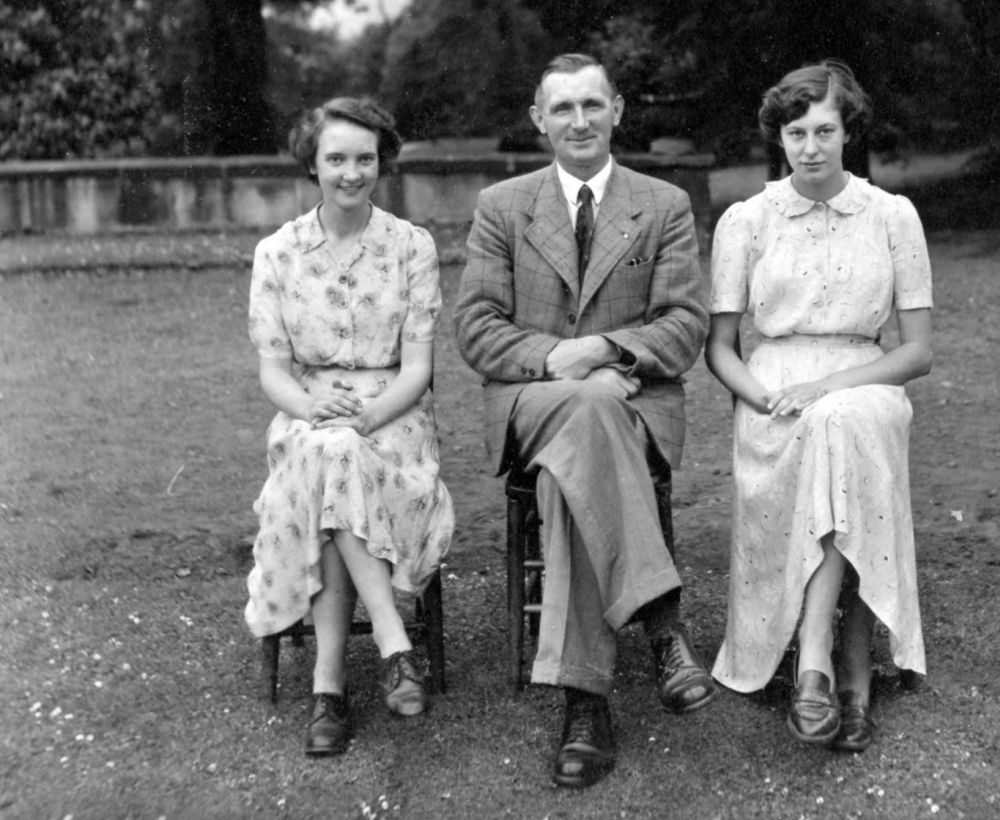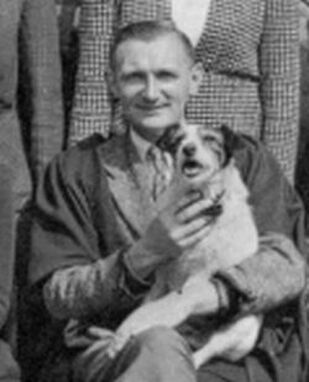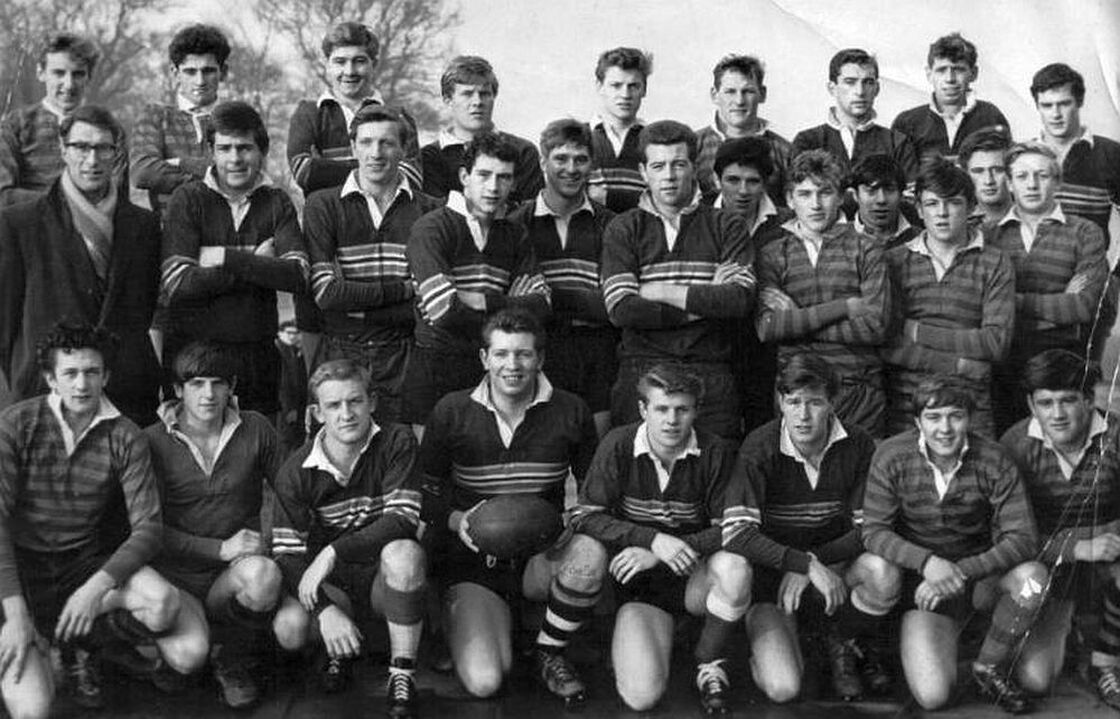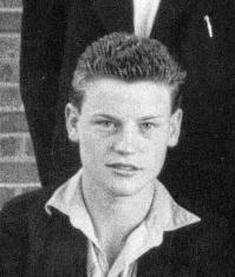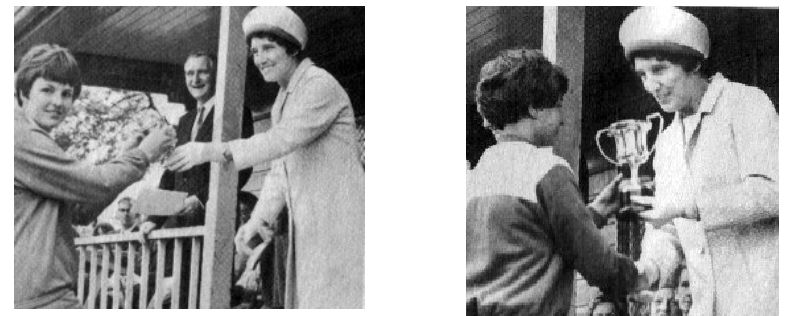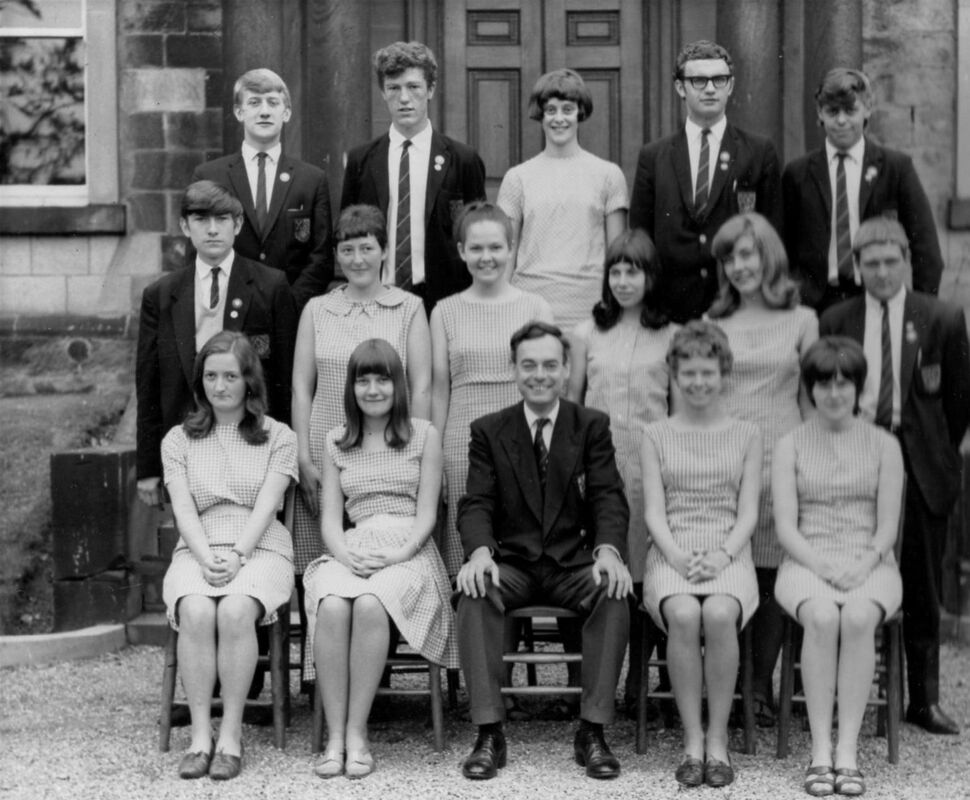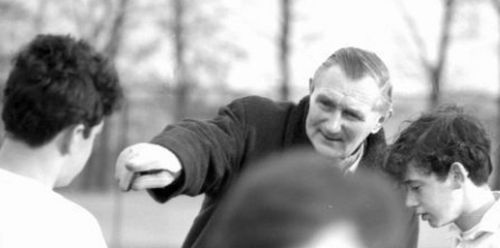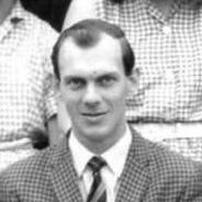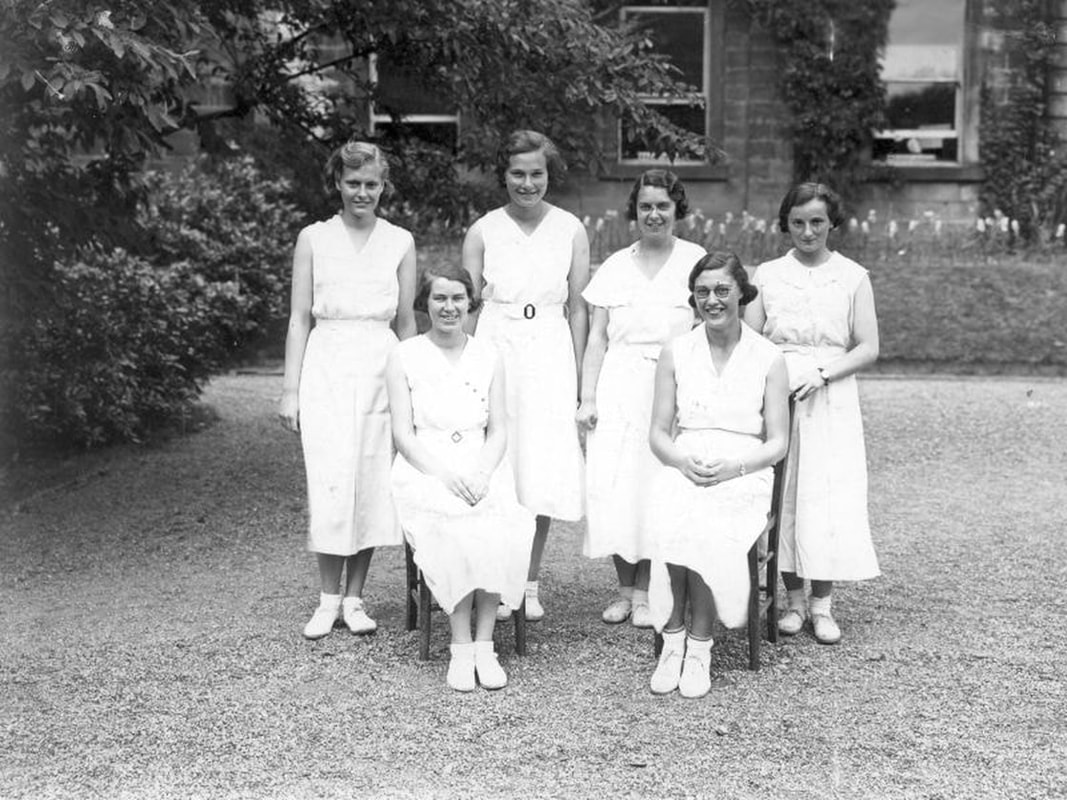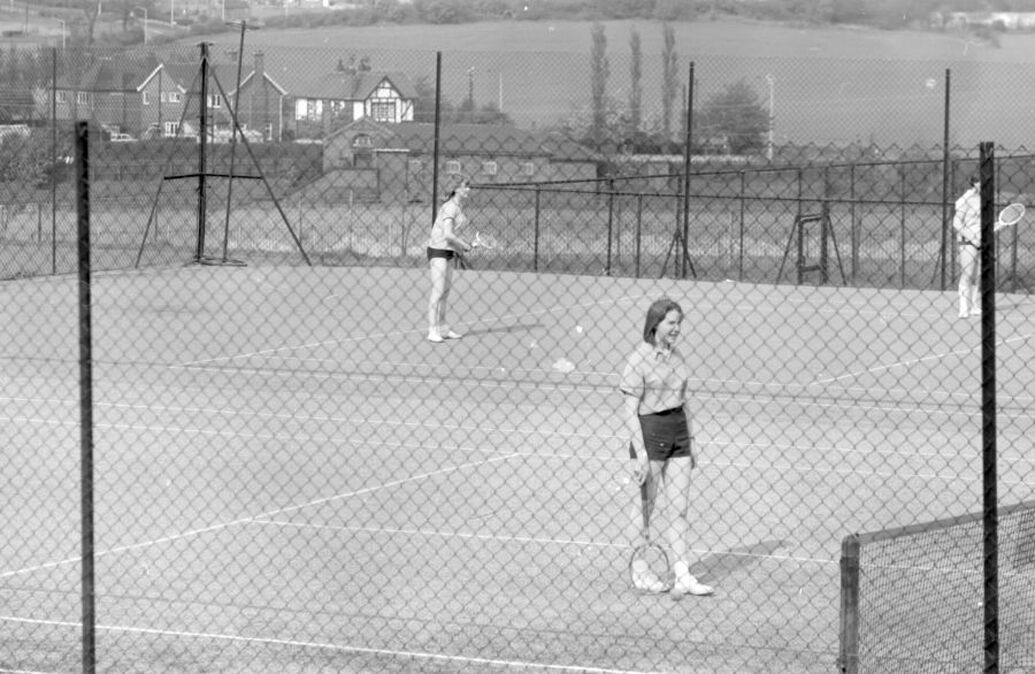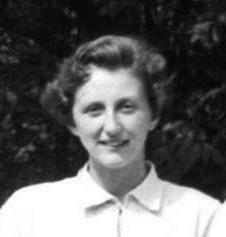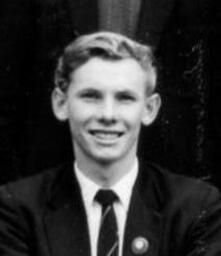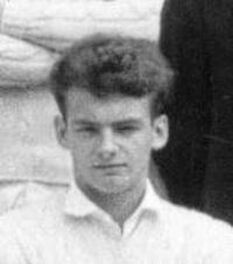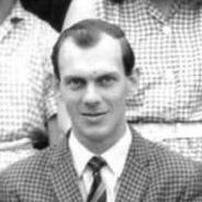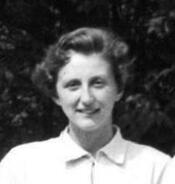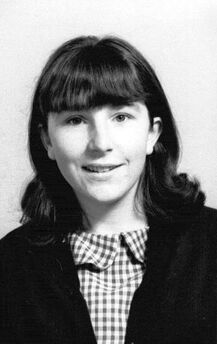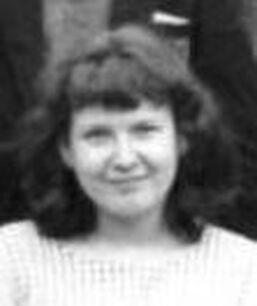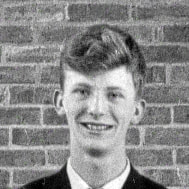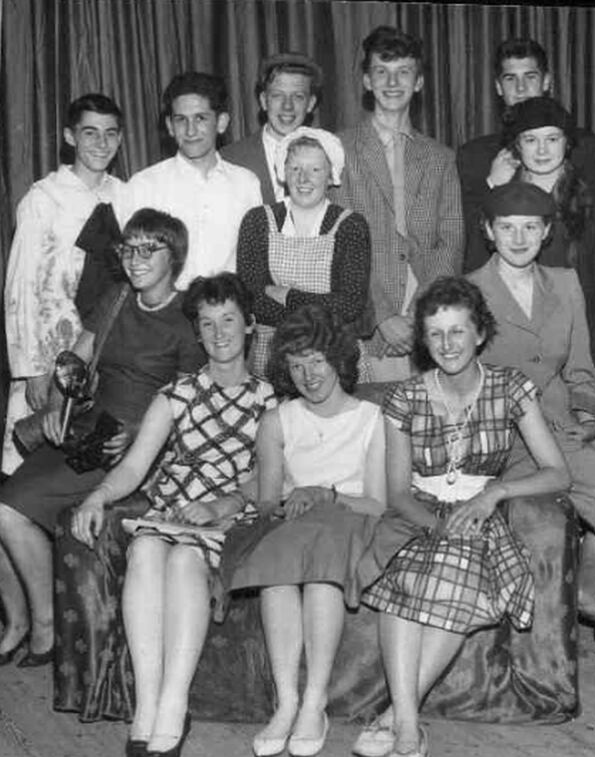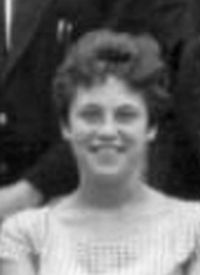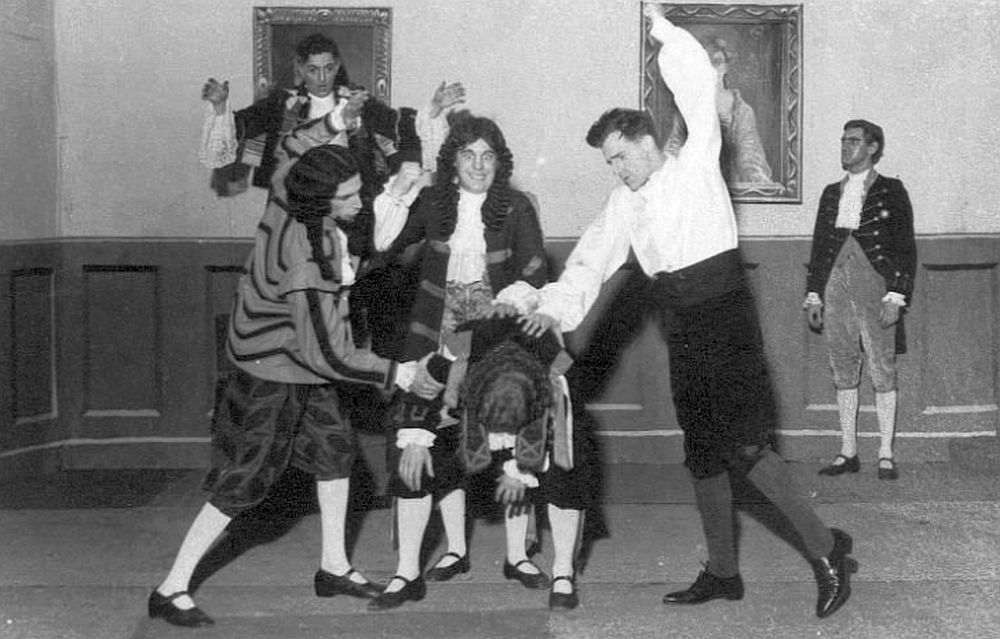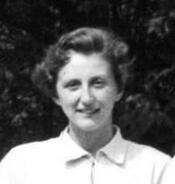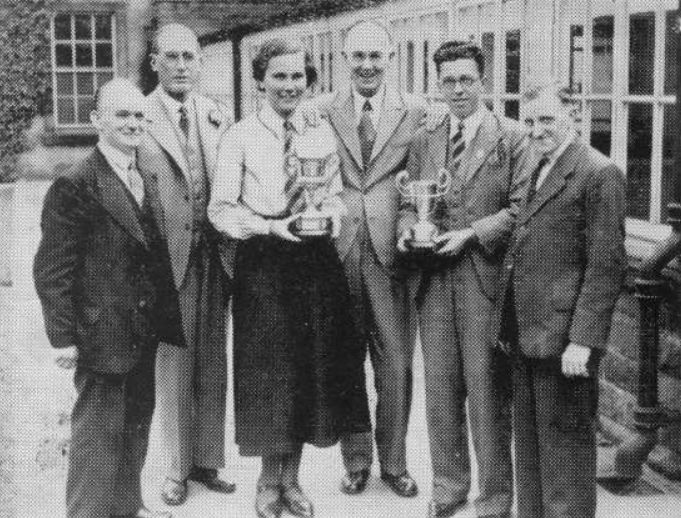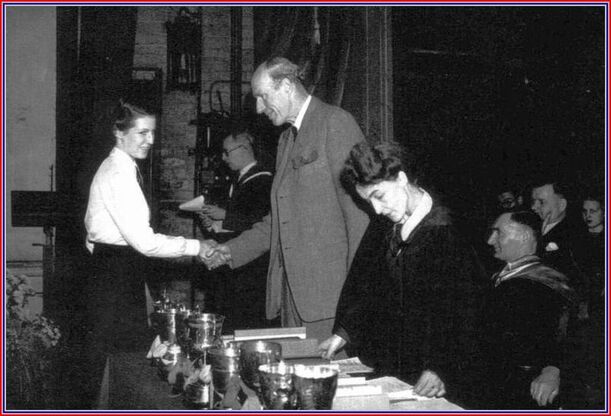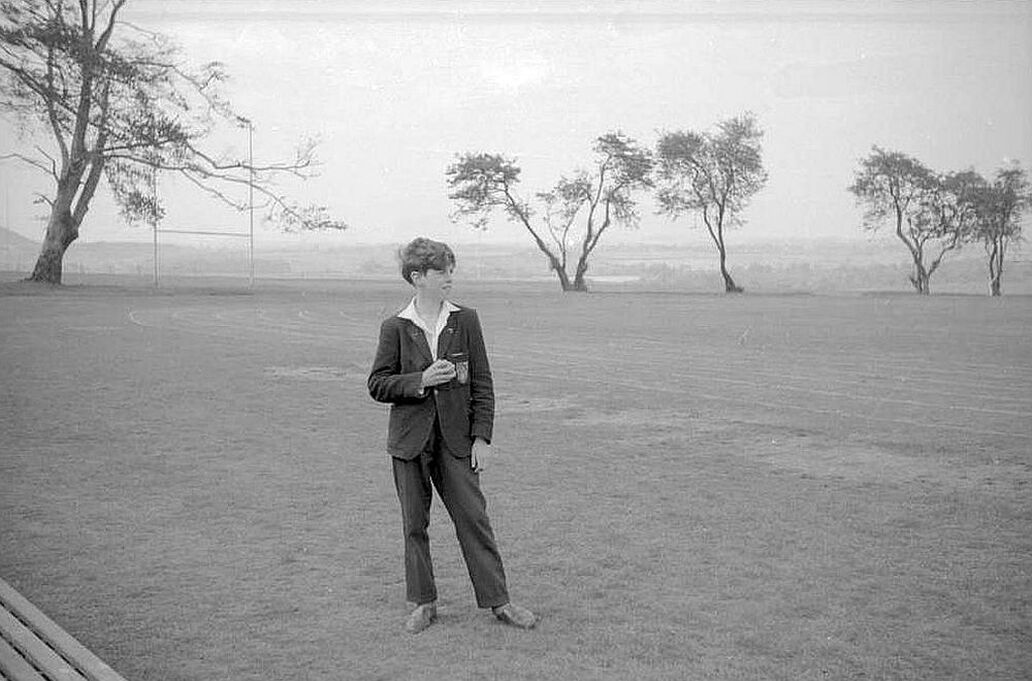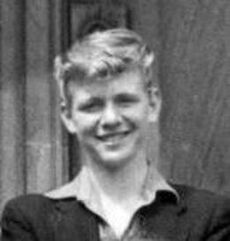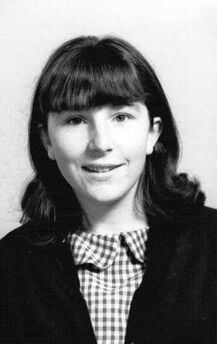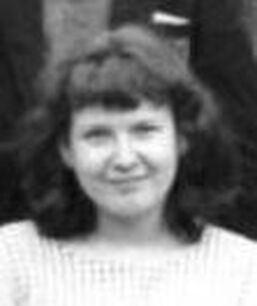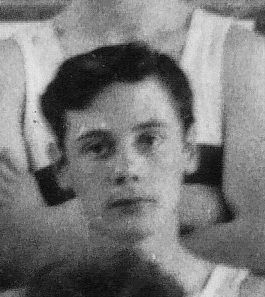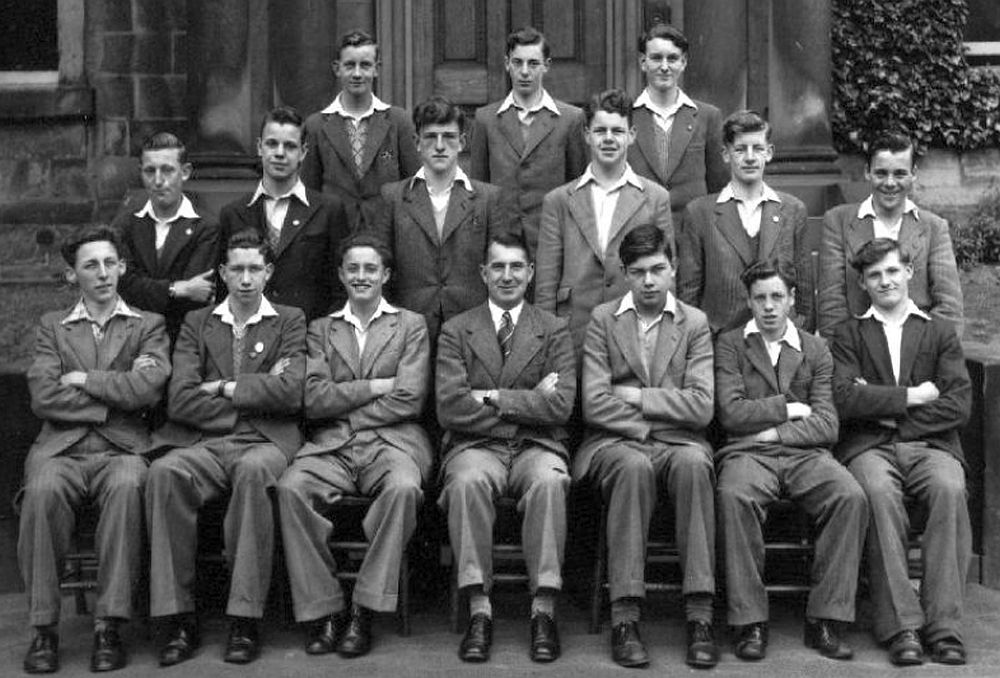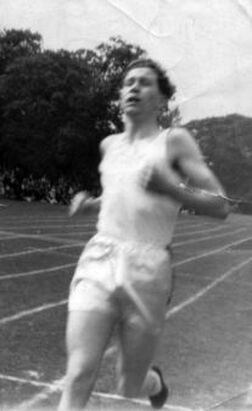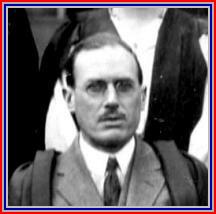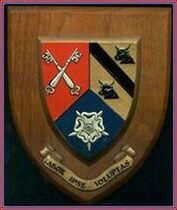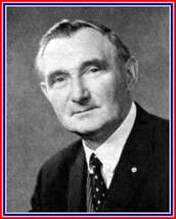Posts about Hemsworth Grammar School 2
Updated 15.04.2023
Updated 15.04.2023
Mr. Hamilton and his secretaries, School Year
1949-50
L-R: Marie Johnson, Mr. Hamilton, Sheila Close.
The photograph was taken on the Forecourt of HGS.
1949-50
L-R: Marie Johnson, Mr. Hamilton, Sheila Close.
The photograph was taken on the Forecourt of HGS.
|
Table of Contents
1. Aims to achieve (RWH) 2. Generations of HGS Rugby players 3. Co-education (RWH) 4. Sport in the Curriculum (RWH) 5. 1928: The Tennis Courts |
6. Decades ago
7. A quote from Melvyn 8. The Drama Club 1961 9. Reflections on Life at Hemsworth Grammar School 10. Where did the Competition Cups come from? 11. Space and Support 12. The One Mile Record |
1. The Mr. Hamilton Interview in 1962. Number 3
Aims to achieve
Aims to achieve
Q. What do you think the School sets out to do for its pupils?
A. Two things. Firstly we try to educate in the sense that when the pupils leave School they will take with them the ability to get the most out of life. Some pupils' great interest in life may be sport. We hope that when the pupil leaves, we will have given a slight insight into music, for instance. Another pupil's sole interest may be music. We hope that when that pupil leaves, some knowledge about sport will have been acquired as well as an understanding of why people can be enthusiastic about games. We hope that the individual will have an interest in far more things than the particular side he is good at naturally. Therefore, the pupil's potential for having a really full life is as great as it is possible for it to be.
Secondly, the School gives the pupil an opportunity to acquire those qualifications which permit the taking up of careers which would otherwise not be possible. We have an eye to the career of a pupil, but we never forget that the real job of the School is to educate pupils in the widest sense. To fit a pupil for a career is secondary to this.
A. Two things. Firstly we try to educate in the sense that when the pupils leave School they will take with them the ability to get the most out of life. Some pupils' great interest in life may be sport. We hope that when the pupil leaves, we will have given a slight insight into music, for instance. Another pupil's sole interest may be music. We hope that when that pupil leaves, some knowledge about sport will have been acquired as well as an understanding of why people can be enthusiastic about games. We hope that the individual will have an interest in far more things than the particular side he is good at naturally. Therefore, the pupil's potential for having a really full life is as great as it is possible for it to be.
Secondly, the School gives the pupil an opportunity to acquire those qualifications which permit the taking up of careers which would otherwise not be possible. We have an eye to the career of a pupil, but we never forget that the real job of the School is to educate pupils in the widest sense. To fit a pupil for a career is secondary to this.
Melvyn Thomas
I was discussing the school with my wife the other day. She was under the impression that it was a school for "swots". I said the best thing that I took from my schooldays was a desire to learn, always being inquisitive, always trying to find out how and why things work. I never was destined for academia, yet I have taught a good few hundred adults about combustion control and machine operation. Much of which I had also written. That would never have been possible, but for HGS.
I was discussing the school with my wife the other day. She was under the impression that it was a school for "swots". I said the best thing that I took from my schooldays was a desire to learn, always being inquisitive, always trying to find out how and why things work. I never was destined for academia, yet I have taught a good few hundred adults about combustion control and machine operation. Much of which I had also written. That would never have been possible, but for HGS.
Lesley Wiseman
I totally agree with you. I developed a love for catering and also for theatre. The catering started with Mary Metcalfe and my love of theatre has always been with me since I played the first field mouse in Toad of Toad Hall with Mr. Ken Walsh. I have always followed my start at HGS by never stopping learning!
I totally agree with you. I developed a love for catering and also for theatre. The catering started with Mary Metcalfe and my love of theatre has always been with me since I played the first field mouse in Toad of Toad Hall with Mr. Ken Walsh. I have always followed my start at HGS by never stopping learning!
2. Generations of HGS Rugby players
Photo contributed by Sid Kenningham.
Back Row L-R: Des Jones, Andrew Hudson, Ron Hooley, Dave Sugden, Brian May, Ron Newitt, Gerald Ackroyd, Roy Homer, Sid Kenningham.
Middle Row L-R: Les Tate, Pete Richmond, Norman Yates, Len Linsey, Dave Nuttall, John Colley, Thorpe, Neil Stone, Norman Tate, Howard Fisher, John King, Dave Fearnside.
Front Row L-R: Melvin Midgley, Vic Hryschko, Geoff Cartledge, Pete Douglas, Albert Parkin, Terry Deeley, Ken Johnson, Roger Poole.
Middle Row L-R: Les Tate, Pete Richmond, Norman Yates, Len Linsey, Dave Nuttall, John Colley, Thorpe, Neil Stone, Norman Tate, Howard Fisher, John King, Dave Fearnside.
Front Row L-R: Melvin Midgley, Vic Hryschko, Geoff Cartledge, Pete Douglas, Albert Parkin, Terry Deeley, Ken Johnson, Roger Poole.
The picture was taken outside the Gym overlooking the all weather surface with the old first team pitch to the right. I think it was the last season that Les was in charge of PE before he went to Dinnington High School.
Brian May.
Brian May.
I feel fortunate to have spent time with the majority of the above players either at HGS, after HGS or both. Their skills at this game were excellent and made HGS teams very hard to beat. Their athletic versatility and fitness, I remember well. The players above include an England Rugby captain, Yorkshire and South Yorkshire rugby players, cricketers and athletes. HGS certainly provided the opportunity to find your sport and excel at it.
Dave
Dave
Photo from Sid Kenningham.
Back Row L-R: Sid Kenningham, Brian May, Mr. L.M. Tate, Norman Tate, Peter Douglas, Terry Deeley
Front Row L-R: Andrew Hudson, Albert Parkin.
Mr. Tate left HGS for Dinnington H.S. in July 1964. The Hilmians and the School say “Thank you”.
Front Row L-R: Andrew Hudson, Albert Parkin.
Mr. Tate left HGS for Dinnington H.S. in July 1964. The Hilmians and the School say “Thank you”.
3. The Mr. Hamilton Interview in 1962. Number 4
Co-education
Co-education
Q. What would you say are the main advantages of co-education?
A. My own feeling is that a co-educational grammar school gives a better education than a single-sex school. A boys' school is too masculine in its approach - it is rougher and tougher; whereas a girls' school, I would imagine, tends to be gentler and softer in its approach. In a co-educational school you get the mean, the best of both worlds. The boys become a little more gentlemanly; the girls rather tougher. In a boys' school, the teacher has to drive a lot harder than in a mixed school. The combination of the sexes in the classroom makes the boys settle down and try, eventually, to overtake the girls. I'm always for a mixed school, having had experience of both. When it comes to social life - plays, dances and that sort of thing - the mixed school has it every time.
A. My own feeling is that a co-educational grammar school gives a better education than a single-sex school. A boys' school is too masculine in its approach - it is rougher and tougher; whereas a girls' school, I would imagine, tends to be gentler and softer in its approach. In a co-educational school you get the mean, the best of both worlds. The boys become a little more gentlemanly; the girls rather tougher. In a boys' school, the teacher has to drive a lot harder than in a mixed school. The combination of the sexes in the classroom makes the boys settle down and try, eventually, to overtake the girls. I'm always for a mixed school, having had experience of both. When it comes to social life - plays, dances and that sort of thing - the mixed school has it every time.
U6A 1965-66
Back Row L-R: David Cooper, Jack Marston, Janice Hanwell, Keith Shelley, Stuart Haigh
Middle Row L-R: David Biggs, Pat Kilvington, Patricia Walton, Hilary Atherton, Margaret Merrington, Ken Johnson
Front Row L-R: Jean Kilvington, Susan Crawshaw, Mr. Minards, Patricia Rhodes, Gillian M. Hawcroft
Middle Row L-R: David Biggs, Pat Kilvington, Patricia Walton, Hilary Atherton, Margaret Merrington, Ken Johnson
Front Row L-R: Jean Kilvington, Susan Crawshaw, Mr. Minards, Patricia Rhodes, Gillian M. Hawcroft
4. The RWH interview 1962. Number 5.
Sport in the curriculum
Sport in the curriculum
Mr Hamilton helps at half time on the 15th October 1966 in a Hockey match against Nunthorpe G.S.
Q. What importance do you attach to sport in the curriculum?
A. Not as much now as in my earlier days. Then I was very active in games and attached greater importance to sport than perhaps it ought to have. Even now, I say that sport is very important in a school, but I think that the other things are important too. I would devote more time now to the fostering of music and drama and other cultural pursuits than I would have been prepared to give when I was young. All my time was taken up with sport: I knew nothing of acting, nothing about music, and even less about art. I think that my life has been the poorer because of this, I missed an awful lot, but I didn't worry about it at the time. Now I realise how much I missed and I have been trying in various ways to make up for it.
Of course, I would not like to see these other things fostered at the expense of sport. Games teach you to give every ounce of physical effort, to take knocks and to give them. They teach you to control your temper and to respect the other person. These things are valuable because the pupil who becomes a good sportsperson, even when playing days are over, knows what is meant by good sportsmanship. The individual carries over these ideals into other walks of life. There are those who think that we have overplayed this idea in this country. I wouldn't have thought we had. However, I wouldn't like to think that in any school I was connected with, games were the thing and other activities didn't matter.
A. Not as much now as in my earlier days. Then I was very active in games and attached greater importance to sport than perhaps it ought to have. Even now, I say that sport is very important in a school, but I think that the other things are important too. I would devote more time now to the fostering of music and drama and other cultural pursuits than I would have been prepared to give when I was young. All my time was taken up with sport: I knew nothing of acting, nothing about music, and even less about art. I think that my life has been the poorer because of this, I missed an awful lot, but I didn't worry about it at the time. Now I realise how much I missed and I have been trying in various ways to make up for it.
Of course, I would not like to see these other things fostered at the expense of sport. Games teach you to give every ounce of physical effort, to take knocks and to give them. They teach you to control your temper and to respect the other person. These things are valuable because the pupil who becomes a good sportsperson, even when playing days are over, knows what is meant by good sportsmanship. The individual carries over these ideals into other walks of life. There are those who think that we have overplayed this idea in this country. I wouldn't have thought we had. However, I wouldn't like to think that in any school I was connected with, games were the thing and other activities didn't matter.
Terry McCroakam
I captained the Old Hilmians Cricket team in Mr. Hamiltons last 2 years at HGS. He played in most of the matches both home and away. He fielded very well for a person of retiring age, as well as bowling his overs of spin. He enjoyed his sport including playing Hockey and watching Rugby in the winter.
I captained the Old Hilmians Cricket team in Mr. Hamiltons last 2 years at HGS. He played in most of the matches both home and away. He fielded very well for a person of retiring age, as well as bowling his overs of spin. He enjoyed his sport including playing Hockey and watching Rugby in the winter.
5. 1928: The Tennis Courts
Back Row L-R: May Madeley, Betty Mulheir, Kathleen Perry, Gertie Ramsden
Front Row L-R: Doris Hainsworth, Joyce Higgett
Front Row L-R: Doris Hainsworth, Joyce Higgett
Kenneth Johnson
How elegant!!
How elegant!!
Some talk of Suzanne Lenglen and some of Helen Wills,
And praises of their exploits nearly half a paper fills;
But both these famous players will be put right in the shade
By the dashing girls of Hemsworth – when the tennis courts are made.
They’ve the necessary talent and the sinews of a man,
And as for wearing bandeaus they look smarter than Suzanne;
But their rise to fame is hindered, their paths to glory stayed,
They’re to wait until the necessary tennis courts are made.
Now do your bit towards them, to obtain them spare no pain,
Don’t forget to pay your pennies – pay up and pay again.
Remember that you’re helping now to make some Hemsworth girl
In the not too distant future Tennis Champion of the World.
(Possibly written by James Keenan, VL in the summer of 1928)
And praises of their exploits nearly half a paper fills;
But both these famous players will be put right in the shade
By the dashing girls of Hemsworth – when the tennis courts are made.
They’ve the necessary talent and the sinews of a man,
And as for wearing bandeaus they look smarter than Suzanne;
But their rise to fame is hindered, their paths to glory stayed,
They’re to wait until the necessary tennis courts are made.
Now do your bit towards them, to obtain them spare no pain,
Don’t forget to pay your pennies – pay up and pay again.
Remember that you’re helping now to make some Hemsworth girl
In the not too distant future Tennis Champion of the World.
(Possibly written by James Keenan, VL in the summer of 1928)
I’m sure that every girl who attended the school will at some point have spent a lesson on the hard playing surface of the tennis courts at the far end of the playing fields. The dual function of that playing surface was marked out in white painted lines for netball as well as tennis. In my schooldays (1955-62) the girls practiced netball during PE lessons, and played the School and House netball matches there. We had no idea of the story of their creation, blithely accepting their existence without question, as only children can.
The story of the struggle to provide this facility is one of dogged determination and effort by pupils, Staff and Governors alike. The first mention of the need to have Tennis Courts was made by the Headmaster, Mr. A.G. Jenkinson at the Speech Days of 1924 and 1925. A formal request for the provision of two grass tennis courts and further, ”hard tennis courts on the ground used as a kitchen garden” (where the Dining Hall was later built) went to the County Authority in 1927, and so began the struggle. A Tennis Court Fund was created, and weekly collections and events such as Mannequin Parades took place throughout the rest of the 1920’s.The Governors lost no opportunity to regularly request funds from the County Authority for the provision of the courts, but were unsuccessful.
Sheila
The story of the struggle to provide this facility is one of dogged determination and effort by pupils, Staff and Governors alike. The first mention of the need to have Tennis Courts was made by the Headmaster, Mr. A.G. Jenkinson at the Speech Days of 1924 and 1925. A formal request for the provision of two grass tennis courts and further, ”hard tennis courts on the ground used as a kitchen garden” (where the Dining Hall was later built) went to the County Authority in 1927, and so began the struggle. A Tennis Court Fund was created, and weekly collections and events such as Mannequin Parades took place throughout the rest of the 1920’s.The Governors lost no opportunity to regularly request funds from the County Authority for the provision of the courts, but were unsuccessful.
Sheila
6. Decades ago
"I really cannot believe it is 40 years since I left HGS. Looking at all this for the last 3 hours it just seems like yesterday. Happy days, though we probably didn't appreciate just how happy at the time. In those days our whole lives revolved around school even for sport and leisure. I guess we were lucky to be so well provided for."
Peter Cooper (February 2003)
Peter Cooper (February 2003)
Looking back to those far-off days, I find myself agreeing with Peter. School was a dominant force. Failure at HGS, to me, was not an option. After homework and clubs/societies, there were school-controlled theatre visits, dances, music concerts, School plays, Staff plays and, of course, Sport. There was little time for anything else. The one exception, to me, was weight-training at Upton Youth Club.
Dave
Dave
I agree too. I enjoyed my time as a scholar and the last two years as a Teacher there before the unnecessary 1967 changes from HGS TO HHS.
Terry McCroakam
Terry McCroakam
What we had at HGS
I came across this little gem in a green Exercise Book with a linen spine. The entries at the back list height and weight twice a year as taken by the PE teacher, which in my case was Miss Parkin 1955 and 56. She married and became Mrs Blatherwick for 1957, and by the end of 1957 Olive Walker had taken over until 1959. Miss Musgrave then made the rest of the entries until I left in 1962. There was also a House record on this back page, filled in for the whole of my HGS school life by the Holgate teacher - Miss Kath Ward. It listed involvement in Music Competitions, House Dramatics, Swimming(!), Netball, Hockey, Tennis, Athletics, House Relay Team, and added to these, in the 6th year House Vice-Captain, 7th year House Captain. How did we ever have time for lessons! These activities which we took so much for granted are now paraded as something special in today's educational scene. Such diversity of opportunity was the norm for us, and included after-school clubs, Geography Trips, Holidays Abroad, Trips to Stratford, Ilkley Sevens, Yorkshire Championships, School Plays, Music Competitions, Film Society, Esperanto, Chess, a Bridge Club, the Student Christian Movement, and an annual London visit by a small group of pupils for the Conference of the Council for World Citizenship. We were entertained by the Staff Play and the Music Concert. We were stretched by the team games of Hockey, Tennis, Rugby, Netball, Rounders, and Cricket,where progress was rewarded with team colours. We could shine as individuals on the athletic field, in a debate in the lecture theatre or musically on the stage in the main hall. Form prizes were awarded annually during Speech Day at the Hippodrome to those who shone academically. Some wrote poetry, others produced the School Magazine. In 1961 a French Exhibition was staged in the library by the 4th form, and there was a Drama Club of lower 6th students which toured a production around the area in aid of various charities. I have probably missed something, other than the Fives court, but even from this ad hoc remembrance, one can see that the HGS philosophy was to equip its pupils to get the most out of life when they left, and to give them a taste of things other than those at which they were naturally gifted.
Those people we all met at HGS came into our lives for a reason, a season or a lifetime. Any way you look at it - it was a memorable time for everyone, and this site celebrates it.
Sheila
Those people we all met at HGS came into our lives for a reason, a season or a lifetime. Any way you look at it - it was a memorable time for everyone, and this site celebrates it.
Sheila
7. A quote from Melvyn
"The HGS website is a really great collection of memories. Not just our memories but ones that stretch back decades. Parallel lines, or lives, that meet, cross, diverge, separate, sometimes adsorbed sometimes absorbed. We all went there for a brief moment of time, yet the memories still linger. What a pity that the authorities decided that traditions were no longer relevant."
Melvyn Thomas
Melvyn Thomas
Christine Fitzpatrick
I think that the older we get, the clearer the past becomes. I have happy memories of my time at Hemsworth Grammar School. It gave me a good education that I have been grateful for too.
Linda Jagger
Very true, Melvyn. The memories are so strong. Other people's memories resonate and trigger further nostalgia. It feels a bit self-indulgent sometimes - but I like it!
Susan Hart
So true. I don’t think our kids and grandkids feel the same about their schooldays sadly.
So true. I don’t think our kids and grandkids feel the same about their schooldays sadly.
Terry McCroakam
I think a lot of that is due to the lack of friendly competition, e.g. House system, inter-school matches and position in subject classes. Assemblies led by the Head in a morning. The spirit of the school is not there anymore. I am sure.
I think a lot of that is due to the lack of friendly competition, e.g. House system, inter-school matches and position in subject classes. Assemblies led by the Head in a morning. The spirit of the school is not there anymore. I am sure.
Susan Hart
I agree that friendly competition stimulates pride in belonging to a group of like minded individuals and the ability to strive to improve without toxic rivalries.
I agree that friendly competition stimulates pride in belonging to a group of like minded individuals and the ability to strive to improve without toxic rivalries.
Christine Fitzpatrick
You're both correct. It gave us a sense of belonging and safety. I think it would be a good thing to instigate in schools today where there are such pressures on pupils.
You're both correct. It gave us a sense of belonging and safety. I think it would be a good thing to instigate in schools today where there are such pressures on pupils.
8. The Drama Club 1961
This year has seen the formation of a new club, “The Drama Club”, which is open to all members of the Lower Sixth. Briefly the aim of the club is to present a play throughout the district for various clubs and charitable organisations. Obvious financial difficulties have been overcome by offering to perform for those who could provide us with a hall and who would be willing to pay the royalties for the play itself. The play chosen was “Happy Days”, a farce by Wilfred Massey, and rehearsals were under way throughout the Summer Term. The actual performances were given during late June and early July. It is hoped that future Sixth Formers will continue this hard but rewarding work, and that eventually the club will become a permanent feature of the School.
In conclusion, on behalf of the members, I would like to thank the Headmaster and Mr. Reed for their advice and guidance and also all other members of staff who have so willingly given up their time to help and encourage us.
Peter Kaye, L6A (Talbot)
In conclusion, on behalf of the members, I would like to thank the Headmaster and Mr. Reed for their advice and guidance and also all other members of staff who have so willingly given up their time to help and encourage us.
Peter Kaye, L6A (Talbot)
HGS Drama Club 1961 Happy Days Cast members:
Back Row L-R: Wray Vamplew, Godfrey Wass, Pete Dickens, Pete Kaye, Tony Hince
Middle Row L-R: Ellen Toulson, Carol Johns, Joan Laycock, Susan Marsh
Front Row L-R: Margaret Curran, Pat Cockburn, Sheila Kelsall
Crucial to the whole organisation was Fran Harrison (photo below) for transporting all our props and costumes. Thanks, Fran!
Back Row L-R: Wray Vamplew, Godfrey Wass, Pete Dickens, Pete Kaye, Tony Hince
Middle Row L-R: Ellen Toulson, Carol Johns, Joan Laycock, Susan Marsh
Front Row L-R: Margaret Curran, Pat Cockburn, Sheila Kelsall
Crucial to the whole organisation was Fran Harrison (photo below) for transporting all our props and costumes. Thanks, Fran!
Fran Harrison
Drama Club presents Happy Days
About three months ago, a sixth form pupil at Hemsworth Grammar School, had the idea of forming a Drama Club among members of the Lower Sixth to perform plays for various charities and churches in the area. He got together a group of Sixth Form pupils and told them of his idea which they liked immediately, and so the Hemsworth Drama club was formed. They chose a play and started rehearsals and on Tuesday night they gave the first performance of “Happy Days”, an hilarious comedy by William Massey, at the Church Hall, Fitzwilliam in aid of Kinsley Parish Church and Youth Club. The play tells the story of Reginald Blougham, a young man who, under his mother’s will has a monthly allowance so long as he does some kind of work. To overcome the difficulty of work, Reginald writes occasionally, although not very profitably. Reginald’s allowance is looked after by his uncle, Bagshot Pilkington, who is anxious for him to marry a sausage magnate’s daughter. Reginald, however, has his own ideas about matrimony and intends to marry Leslie Royston. Of course, Uncle Bagshot is not pleased about this, but after many ups and downs and arguments, everything, as is to be expected, turns out well.
Peter Kaye, in the part of Reginald Blougham (pronounced “Bloom”), takes the heaviest burden in the play and is the mainstay behind the production. He portrays the unfortunate young man with a professional ease which is so rarely seen on the amateur stage. The part of his uncle is convincingly played by Peter Dickens. Patricia Cockburn is a charming fiancee. Margaret Curran, as Ruth Eltringham, Wray Vamplew as Jimmy Harbottle and Sheila Kelsall as Twinky Farrell are delightfully true to life. Carol Johns plays the part of Mrs. Lash, the daily help, and gives a convincing performance. Other parts are played by Joan Laycock (Miss Twinge), Susan Marsh (Miss Cattermole), Ellen Toulson (Cordelia B. Parkenstalker) and Anthony HInce (Ramshaw Skentlebury), all of the Daily Comet. Responsible for the production were Godfrey Wass and Peter Kaye. All the costumes, make up, lighting and scenery were arranged by members of the Drama Club.
Other performances of the play are to be given tomorrow (Saturday) at the Methodist Hall, Shafton (in aid of the Shafton Darby and Joan Club);
June 26th at the Church Hall, Goldthorpe (in aid of the Goldthorpe Old Age Pensioners);
June 29th at the Welfare Hall, Rossington (in aid of the Rossington Guild of Cripples);
June 30th at the Church Hall, Ryhill (in aid of Ryhill Parish Church);
July 4th at the Miners’ Institute, Moorthorpe (in aid of the South Kirkby Spastic Group) and July 11th at the Grammar School, Hemsworth.
The proceeds from the last performance will go towards expenses of the club and to entertaining a group of children from the Hemsworth Children’s Home. The remainder will be given to the Save the Children Fund.
About three months ago, a sixth form pupil at Hemsworth Grammar School, had the idea of forming a Drama Club among members of the Lower Sixth to perform plays for various charities and churches in the area. He got together a group of Sixth Form pupils and told them of his idea which they liked immediately, and so the Hemsworth Drama club was formed. They chose a play and started rehearsals and on Tuesday night they gave the first performance of “Happy Days”, an hilarious comedy by William Massey, at the Church Hall, Fitzwilliam in aid of Kinsley Parish Church and Youth Club. The play tells the story of Reginald Blougham, a young man who, under his mother’s will has a monthly allowance so long as he does some kind of work. To overcome the difficulty of work, Reginald writes occasionally, although not very profitably. Reginald’s allowance is looked after by his uncle, Bagshot Pilkington, who is anxious for him to marry a sausage magnate’s daughter. Reginald, however, has his own ideas about matrimony and intends to marry Leslie Royston. Of course, Uncle Bagshot is not pleased about this, but after many ups and downs and arguments, everything, as is to be expected, turns out well.
Peter Kaye, in the part of Reginald Blougham (pronounced “Bloom”), takes the heaviest burden in the play and is the mainstay behind the production. He portrays the unfortunate young man with a professional ease which is so rarely seen on the amateur stage. The part of his uncle is convincingly played by Peter Dickens. Patricia Cockburn is a charming fiancee. Margaret Curran, as Ruth Eltringham, Wray Vamplew as Jimmy Harbottle and Sheila Kelsall as Twinky Farrell are delightfully true to life. Carol Johns plays the part of Mrs. Lash, the daily help, and gives a convincing performance. Other parts are played by Joan Laycock (Miss Twinge), Susan Marsh (Miss Cattermole), Ellen Toulson (Cordelia B. Parkenstalker) and Anthony HInce (Ramshaw Skentlebury), all of the Daily Comet. Responsible for the production were Godfrey Wass and Peter Kaye. All the costumes, make up, lighting and scenery were arranged by members of the Drama Club.
Other performances of the play are to be given tomorrow (Saturday) at the Methodist Hall, Shafton (in aid of the Shafton Darby and Joan Club);
June 26th at the Church Hall, Goldthorpe (in aid of the Goldthorpe Old Age Pensioners);
June 29th at the Welfare Hall, Rossington (in aid of the Rossington Guild of Cripples);
June 30th at the Church Hall, Ryhill (in aid of Ryhill Parish Church);
July 4th at the Miners’ Institute, Moorthorpe (in aid of the South Kirkby Spastic Group) and July 11th at the Grammar School, Hemsworth.
The proceeds from the last performance will go towards expenses of the club and to entertaining a group of children from the Hemsworth Children’s Home. The remainder will be given to the Save the Children Fund.
A newspaper clipping dated June 24th 1961 has come to light. It reads as follows:
Grammar School Drama Club
Good start at Hemsworth
The dream of a Hemsworth Grammar School Sixth former Peter Kaye to form a drama club at the school to perform for charity came true on Tuesday, when the club broke the ice with a production of “Happy Days” at the Church Hall, Fitzwilliam. The proceeds were in aid of Kinsley Parish Church and the Church Youth Club. Peter, who lives at Brierley, put forward his idea to several classmates and the response was so good that the Hemsworth Drama Club has been born. The aim of the club is to run a series of one-night productions throughout the district and give the proceeds to local charitable organisations such as the Darby and Joan clubs, spastics and old age pensioners. The group decided on a comedy for their first attempt and Wilfred Massey’s “Happy Days” proved a hilarious success at Kinsley. It is the story of a rich young man, who as well as working, receives a substantial allowance from his mother’s will, and the tussle he has with his uncle in trying to get permission to marry. Peter Kaye sets a shining example as the young man, while his uncle is convincingly portrayed by Peter Dickens, with Patricia Cockburn a charming fiancée. Other parts are played by Margaret Curran, Wray Vamplew, Sheila Kelsall, Carol Johns, Joan Laycock, Susan Marsh, Ellen Toulson and Anthony Hince. The producers were Peter Kaye and Godfrey Wass.
Grammar School Drama Club
Good start at Hemsworth
The dream of a Hemsworth Grammar School Sixth former Peter Kaye to form a drama club at the school to perform for charity came true on Tuesday, when the club broke the ice with a production of “Happy Days” at the Church Hall, Fitzwilliam. The proceeds were in aid of Kinsley Parish Church and the Church Youth Club. Peter, who lives at Brierley, put forward his idea to several classmates and the response was so good that the Hemsworth Drama Club has been born. The aim of the club is to run a series of one-night productions throughout the district and give the proceeds to local charitable organisations such as the Darby and Joan clubs, spastics and old age pensioners. The group decided on a comedy for their first attempt and Wilfred Massey’s “Happy Days” proved a hilarious success at Kinsley. It is the story of a rich young man, who as well as working, receives a substantial allowance from his mother’s will, and the tussle he has with his uncle in trying to get permission to marry. Peter Kaye sets a shining example as the young man, while his uncle is convincingly portrayed by Peter Dickens, with Patricia Cockburn a charming fiancée. Other parts are played by Margaret Curran, Wray Vamplew, Sheila Kelsall, Carol Johns, Joan Laycock, Susan Marsh, Ellen Toulson and Anthony Hince. The producers were Peter Kaye and Godfrey Wass.
I seem to remember that the Headmaster only allowed the formation of the Drama Club on the understanding that it would not continue beyond our Lower 6th year, as we all had A level exams to take the following year, and of course they took precedence.
Sheila Kelsall (L6A)
Sheila Kelsall (L6A)
9. Here is an article to which we can possibly relate.
Reflections on Life at Hemsworth Grammar School
Reflections on Life at Hemsworth Grammar School
I always think that my Grammar School life actually began on the morning that our Junior School Headmaster read out the names of those of us who had passed the Scholarship. I literally wept for joy and then, having been given permission because of the occasion, sped home to announce the good news. For the next few weeks I walked on air. There might never before have been a gymslip bought, a School bag polished, a ‘bus pass issued.
The great day arrived and I came down to earth with a most awful bump. I felt very small and insignificant standing there in the School Hall. The prefects looked so tall and reserved; the Staff so remote and stern in their gowns; the gilt lettering round the panelling so formidable and so completely strange. I thought that I would never get used to this School. How I longed for the little School from which I had come. The first day was one mad frightening rush – attempting to find classrooms; learning names; getting dinner tickets (this was always a nightmare to me, as I was always afraid of being left without dinner). Time went on, and of course I did get used to it eventually. School life became quite a routine, with all the odd incidents standing out in my memory.
Funny isn’t it, how all the seemingly unimportant things are remembered best. The first winter was a very severe one – lots of snow and frost and fog. Near our ‘bus stop was a pond where we all used to congregate for a session of sliding before the ‘bus arrived to take us to our hive of industry. One morning, after a severe frost, excitement having quite gone to my head, I ventured on to some thin ice and before I knew what happened I fell in, new gymslip and all. I trailed miserably home to change and for weeks afterwards was tormented with a lot of sarcastic remarks. Talking of frost reminds me of another mild form of torture which I went through that winter. We were learning French phonetics and the effort of saying “a”, “e”, “i” etc. with chapped lips stretched to cracking point was something which has to be experienced before it can be believed.
The Osiris players came to School that winter – it was the first time I had seen anything so wonderful. I sat through the show open-mouthed and developed a great admiration for those women which has not abated in the least. I think that those shows, together with the School plays, were the brightest spots in my School life. My dearest ambition after seeing “She Stoops to Conquer” was to act in a School play and wear a crinoline and a curly wig (I had short, straight hair). This I never managed and so I still nurse in my bosom a burning desire to sweep majestically around in a gorgeous hooped gown.
In the 2nd Form I attended my first film show in the Art room with my first boy friend. We sat on one of the sinks at the back of the room eating toffees and holding sticky, ink-stained hands. I though it all quite wonderful, and so it was until Mr Hamilton came along to us and started a discussion on costumes through the ages. I never forgave him for that!
My first contribution to the School Magazine was made whilst I was in the 2nd Form. It was a short, despairing protest (I had been encouraged in this by my Form master) against the commandeering of the cloakroom mirrors by the senior girls. It brought down on my head a torrent of abuse and I vowed that I would never again write anything for the magazine.
In my 3rd year I joined the Choir and was sure that because of that we won the 1st place in the Pontefract Musical Festival. I can remember nothing about that day – music, adjudication, songs or anything, except the fact that Miss Townsend bought a great bag of toffees and handed them round in the ‘bus. (Stomach again.)
The work we did at School, the examinations, the homework we did or did not do, are all quite hazy now, but the little, silly things are still fresh in my mind such as: forgetting my magazine money after a final warning and being reduced to a dithering idiot by the cutting remarks of the English teacher; sliding down the corridor and falling right at Miss Shortridge’s feet as she came round the corner; seeing Miss Kenward faint in the Staff Play and wondering how she did it without hurting herself; hating the doctor’s periodic visits; acting behind the footlights for the first time, and hundreds of others which, if I were to write them all down here would probably fill the magazine.
They were grand days and though not exactly the happiest days of my life, they rank a close second. I only wish that all the children now at the old School and those who are yet to come will have in their later years as happy memories of their School days as I have.
’Persome’
The great day arrived and I came down to earth with a most awful bump. I felt very small and insignificant standing there in the School Hall. The prefects looked so tall and reserved; the Staff so remote and stern in their gowns; the gilt lettering round the panelling so formidable and so completely strange. I thought that I would never get used to this School. How I longed for the little School from which I had come. The first day was one mad frightening rush – attempting to find classrooms; learning names; getting dinner tickets (this was always a nightmare to me, as I was always afraid of being left without dinner). Time went on, and of course I did get used to it eventually. School life became quite a routine, with all the odd incidents standing out in my memory.
Funny isn’t it, how all the seemingly unimportant things are remembered best. The first winter was a very severe one – lots of snow and frost and fog. Near our ‘bus stop was a pond where we all used to congregate for a session of sliding before the ‘bus arrived to take us to our hive of industry. One morning, after a severe frost, excitement having quite gone to my head, I ventured on to some thin ice and before I knew what happened I fell in, new gymslip and all. I trailed miserably home to change and for weeks afterwards was tormented with a lot of sarcastic remarks. Talking of frost reminds me of another mild form of torture which I went through that winter. We were learning French phonetics and the effort of saying “a”, “e”, “i” etc. with chapped lips stretched to cracking point was something which has to be experienced before it can be believed.
The Osiris players came to School that winter – it was the first time I had seen anything so wonderful. I sat through the show open-mouthed and developed a great admiration for those women which has not abated in the least. I think that those shows, together with the School plays, were the brightest spots in my School life. My dearest ambition after seeing “She Stoops to Conquer” was to act in a School play and wear a crinoline and a curly wig (I had short, straight hair). This I never managed and so I still nurse in my bosom a burning desire to sweep majestically around in a gorgeous hooped gown.
In the 2nd Form I attended my first film show in the Art room with my first boy friend. We sat on one of the sinks at the back of the room eating toffees and holding sticky, ink-stained hands. I though it all quite wonderful, and so it was until Mr Hamilton came along to us and started a discussion on costumes through the ages. I never forgave him for that!
My first contribution to the School Magazine was made whilst I was in the 2nd Form. It was a short, despairing protest (I had been encouraged in this by my Form master) against the commandeering of the cloakroom mirrors by the senior girls. It brought down on my head a torrent of abuse and I vowed that I would never again write anything for the magazine.
In my 3rd year I joined the Choir and was sure that because of that we won the 1st place in the Pontefract Musical Festival. I can remember nothing about that day – music, adjudication, songs or anything, except the fact that Miss Townsend bought a great bag of toffees and handed them round in the ‘bus. (Stomach again.)
The work we did at School, the examinations, the homework we did or did not do, are all quite hazy now, but the little, silly things are still fresh in my mind such as: forgetting my magazine money after a final warning and being reduced to a dithering idiot by the cutting remarks of the English teacher; sliding down the corridor and falling right at Miss Shortridge’s feet as she came round the corner; seeing Miss Kenward faint in the Staff Play and wondering how she did it without hurting herself; hating the doctor’s periodic visits; acting behind the footlights for the first time, and hundreds of others which, if I were to write them all down here would probably fill the magazine.
They were grand days and though not exactly the happiest days of my life, they rank a close second. I only wish that all the children now at the old School and those who are yet to come will have in their later years as happy memories of their School days as I have.
’Persome’
Julie Weston
I also came from a very small school and have some of the feelings of being a small fish in a big pond. Took me a couple of years actually to feel relaxed in the Grammar school.
Keith Twigg
Yes, it is experiencing for the first time, the vastness of the school buildings and grounds that I remember to this day 67 years later.
I also came from a very small school and have some of the feelings of being a small fish in a big pond. Took me a couple of years actually to feel relaxed in the Grammar school.
Keith Twigg
Yes, it is experiencing for the first time, the vastness of the school buildings and grounds that I remember to this day 67 years later.
10. Where did the Competition Cups come from?
They were donated to the school by interested individuals and groups. Here is an example from 1936.
Dr Pycroft donates two cups in 1936
The New House Cups
L-R: Mr. Flavell, Mr. Jenkinson, Betty Mulheir (Head Girl), Dr. Pycroft, Firman L.W. (Head Boy), Mr. Betson
The photograph was taken in the Quadrangle on the Main Hall side.
L-R: Mr. Flavell, Mr. Jenkinson, Betty Mulheir (Head Girl), Dr. Pycroft, Firman L.W. (Head Boy), Mr. Betson
The photograph was taken in the Quadrangle on the Main Hall side.
On Friday July 2nd., the School was made richer by two silver cups presented by the trustees of the South Elmsall Rugby Union Football Club. Dr. Pycroft and Mr. Betson on behalf of the trustees came to give the cups, and Dr. Pycroft offered the School some excellent advice on loyalty and playing the game. Mr. Flavell paid a tribute to the work of Dr. Pycroft and thanked him for the cups. The Headmaster then offered the thanks of the School to Dr. Pycroft for his constant interest in them which would never be forgotten.
Dr. Pycroft
To the great regret of his many friends, Dr. Pycroft will be retiring shortly from professional work and will be leaving the district. His loss will not be felt least by those to whom his enthusiasm for literature and the dramatic arts was at once an aid and an inspiration. It was this enthusiasm, combined with a tireless energy and the most scrupulous attention to detail, that enabled the South Elmsall Fellowship of Players to achieve such a high standard of success. And the same enthusiasm, the same attention to detail, the same sympathy and encouragement were evident in those inter-house competitions over which he presided here, to our great advantage and to his own obvious enjoyment. We shall miss his presence and his kindly help, and we take this opportunity of thanking him again for his many services to the School, and wishing him a long and happy retirement.
Major Jenkonson (Headmaster)
To the great regret of his many friends, Dr. Pycroft will be retiring shortly from professional work and will be leaving the district. His loss will not be felt least by those to whom his enthusiasm for literature and the dramatic arts was at once an aid and an inspiration. It was this enthusiasm, combined with a tireless energy and the most scrupulous attention to detail, that enabled the South Elmsall Fellowship of Players to achieve such a high standard of success. And the same enthusiasm, the same attention to detail, the same sympathy and encouragement were evident in those inter-house competitions over which he presided here, to our great advantage and to his own obvious enjoyment. We shall miss his presence and his kindly help, and we take this opportunity of thanking him again for his many services to the School, and wishing him a long and happy retirement.
Major Jenkonson (Headmaster)
Celia Asher receives a prize on Speech Day
11. Space and Support
At HGS we had space and we had support. How did you use the spacious, lovely school grounds? Was it simply a walk at break or lunchtime, or something more involved? We did not have a great deal of recreation time because we were usually very busy. Our obligation was to complete our schoolwork to the best of our ability and inclination. We had support for our interests. These could be wide-ranging such as choirs, sport or outdoor pursuits. Members of Staff supported us during our school careers and their support was voluntary.
Keith Twigg
My first sight of the grounds of H.G.S. is still etched in my brain. I was barely 11 years of age and compared to the small playground of Broad Lane Junior School in South Elmsall they were vast. Although sometimes not realising it at the time, we were so lucky to be there back in the Glory Days.
Christine Fitzpatrick
I have very happy memories of my time at HGS.The advantage of the vast playing fields I didn't really appreciate til afterwards but it was good to walk around the grounds then sit and put the World to rights. On rainy lunchtimes we were shown films in the science lecture theatre by teachers who used their own time. Looking back we were privileged but most of us used it well.
Linda Jagger
Happy days indeed. I wish I had appreciated them more at the time! We were so lucky.
12. The One Mile Record
One of the boys shown in the 5D photo below (Roy Sault) set the School One Mile Record of 4m 45s on Sports Day 1951. Only one other boy beat that time. It was at an external competition in 1962 (Yorkshire Schools Championships in Bridlington). That boy athlete was John Byrom. His time was 4m. 44.1s. I saw his race at The Headlands School in Bridlington and thoroughly enjoyed his performance.
Dave
Dave
John Byrom
5D 1950-51
Back Row L-R: Hassall, Brian Secker, Pat Jagger
Middle Row L-R: John McAllister, Michael Henson, Booth, Keith Bruce, Benton, Cliff Eyre
Front Row L-R: Alan Mosley, Roy Sault, Les Watson, Mr. Allen, Bruce Ward, Roy Cooke, Parkin
Middle Row L-R: John McAllister, Michael Henson, Booth, Keith Bruce, Benton, Cliff Eyre
Front Row L-R: Alan Mosley, Roy Sault, Les Watson, Mr. Allen, Bruce Ward, Roy Cooke, Parkin
Roy Sault breaks the School Record for the One Mile on Sports Day 1951. The time of 4m 45s was never beaten on later Sports Days. School Records had to be set on Sports Day.
Kenneth Johnson
John Byrom was the most outstanding cross country and middle distance athlete of our era at HGS.
John Byrom was the most outstanding cross country and middle distance athlete of our era at HGS.
John Byrom
I'm humbled by your comment, Kenny. I bore my family to death every time we pass the Bridlington field where the meeting was held.
I'm humbled by your comment, Kenny. I bore my family to death every time we pass the Bridlington field where the meeting was held.
